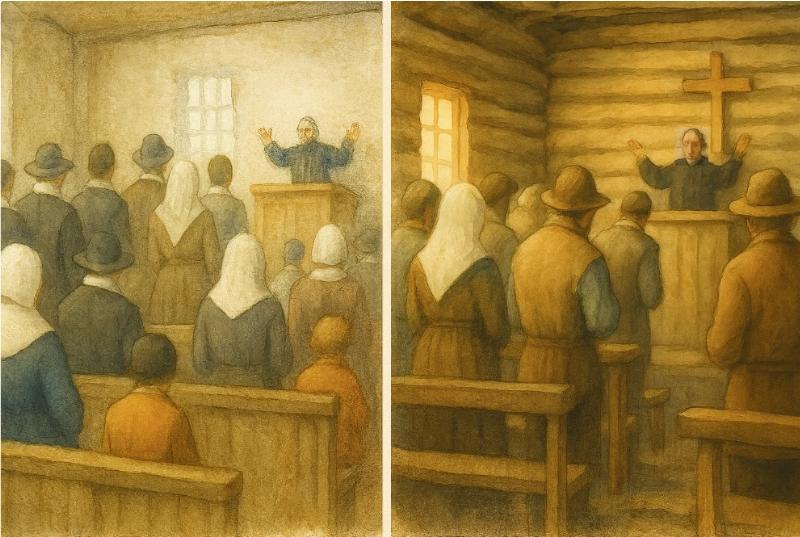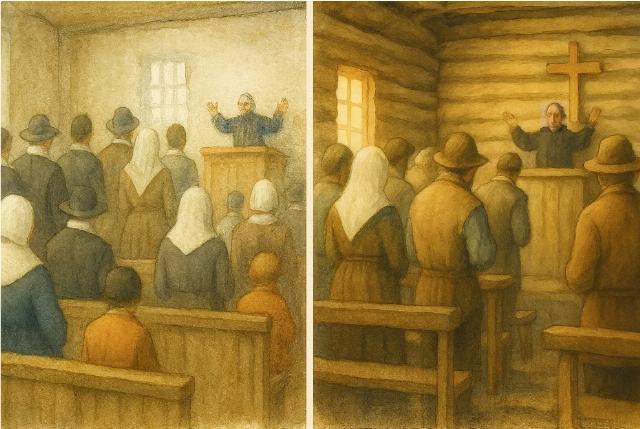


“If the sins of religions seem to eclipse their merits, chart your own spiritual path for truth and wisdom.” This sentence appears near the end of a Harvard Crimson article that briefly summarizes the spiritual orientation at Harvard’s Divinity School throughout its history. The words “chart your own spiritual path” highlight how Christian institutions in the USA fail to offer a universal theology that will inspire and sustain our culture.
While intended as a positive and inspiring phrase, the words “chart your own” are emblematic of the spiritual decline of our country. The spiritual decline is the cause of our moral, political, economic, and cultural decline. Instead of continuing our adherence to biblical values and worship, we have appropriated too many materialistic goals and turned away from Biblical ethics and following God.

Image created using AI.
When one thinks about charting one’s own spiritual path, Oprah Winfrey’s steadfast adherence to the phrase “my truth” comes to mind. Many believe this two-word stamp of approval on one’s self-ordained values shows a respect for the individual that is completely consistent with the American emphasis on freedom and rights.
These two words are aligned with those in William Ernest Henley’s poem Invictus, which states, “I am the master of my ship; I am the captain of my soul.” The poem is such a classic that Timothy McVeigh handed a paper with that poem on it to the warden before he received a lethal injection for murdering 167 people in the Oklahoma City bombing. Yet, the vision the poem presents and the similar vision presented by Oprah place too much emphasis on the power of individuals to create their own destiny.
American individualism has succumbed to a great degree to this understanding that the individual is solely responsible for the outcomes of his or her life. In fact, I was teaching a class in ethics and showed a brief video in which the speaker extolled Aristotle’s ideal of happiness. The speaker concluded that Aristotle believed that his way led to “flourishing,” and spoke as though “flourishing” was a species of the power of positive thinking (Norman Vincent Peale would have been delighted).
However, I would say that the resulting so-called happiness was more inward and deep than mere positive thinking about ourselves or our lives. One writer explains that true happiness—or Eudaimonia—this way: “It is not merely a fleeting emotion or sensation but a deep and lasting state of contentment and fulfillment.”
Thomas Aquinas, writing roughly 1500 years after Aristotle, really appreciated Aristotle’s analysis, but believed that death introduced sorrow into the life of even a successful Aristotelian, and thus corrupted his idea of happiness. For Aquinas, only Christ and the Roman Catholic Church could eternally sustain the parameters of happiness habits developed to balance excess and deficiency.
Making another giant leap forward in time, we can see that the Marxists made a 180-degree turn away from Christianity by emphasizing happiness as having one’s physical needs met. In 1859, Marx said, “From each according to his ability, to each according to his needs.” This principle has been affirmed by leftists and recently by moderates as though it were an affirmation of respect for the individual.
The eminent psychologist Abraham Maslow, in 1943, came out with his hierarchy of needs, a triangular chart where 28 human needs were listed in ascending order in a triangle. Although Maslow was not an avowed follower of Marx, he followed Marx regarding the importance of needs being met as determining identity and the development of successful lives.
Thus, by the middle of the 20th century, the Aristotelian ideal of a balanced mindset as being decisive for a fulfilled and thus happy life, and the Christian ideals that followed for centuries with Catholics and later in Protestant worship in an even purer form, were pushed aside. For Marx, previous forms of morality were merely forms of bourgeois selfishness claiming to be “moral.” Other writers, such as John Stuart Mill or Maslow, were not as hostile to religion as Marx, but came to the conclusion that other institutions and practices were more central to human happiness and positive living.
Mill put forward the principle of the greatest good for the greatest number, and that has been generally accepted as a principle of social policy and a requirement for individual adjustment in Western Civilization. And few would dispute Maslow’s claim that meeting needs is and should be a high priority.
The phrase “Life, liberty, and the pursuit of happiness” is being seen by increasing numbers as a motto for selfish individualism, where exploiting others is justified. We see this stigmatizing of our Declaration of Independence and the country’s founders in recent works like A People’s History of the United States by Howard Zinn and The 1619 Project by Nikole Hannah-Jones.
I believe that Ms. Jones finds these elevated sayings of the Declaration of Independence and the Founding Fathers offensive because they divert attention from what she believes were the Founding Fathers’ underlying selfish and exploitative goals. Their spirituality as Christians was all part of a deceptive amalgamation of devious, heartless, money-making interests.
Although I believe that greed was more present in the founding of Virginia than in the founding of New England, we must understand that, even in that community of macho adventurers, Holy Scripture was essential to their mindset despite an overemphasis on material success. They did not come with families like the colonialists in New England. But when they came to Virginia, they built a fort and a church, where they were required to attend multiple services throughout the week, even though they were rough and tough male adventurers.
The Puritans came with families, explicitly to set up a Biblical city on a hill that would be a light to the entire world. They befriended the Wampanoag tribe, which helped them immensely, and they, in turn, helped the Wampanoags with their struggles against the Pequot tribe.
Can anyone alive today even imagine the depth of faith it took to move to the shores of North America in the early 17th century? Can anyone really believe that selfishness alone could keep those people going through the travails of survival that they faced? Were they merely meeting needs, or operating out of “my truth?”
Greed alone might have been present at the founding, but it did not alone give them the success they achieved. And in New England, we saw a purity of motive that has never been matched. Though troubled by sin then as humankind always has been, their transcendent beliefs opened the door to the nation that was built and survived. I hope we can revive a more foundational view that man belongs to God, and that self-interest and self-reliance and meeting of needs can never bring us the success that we need and desire.
